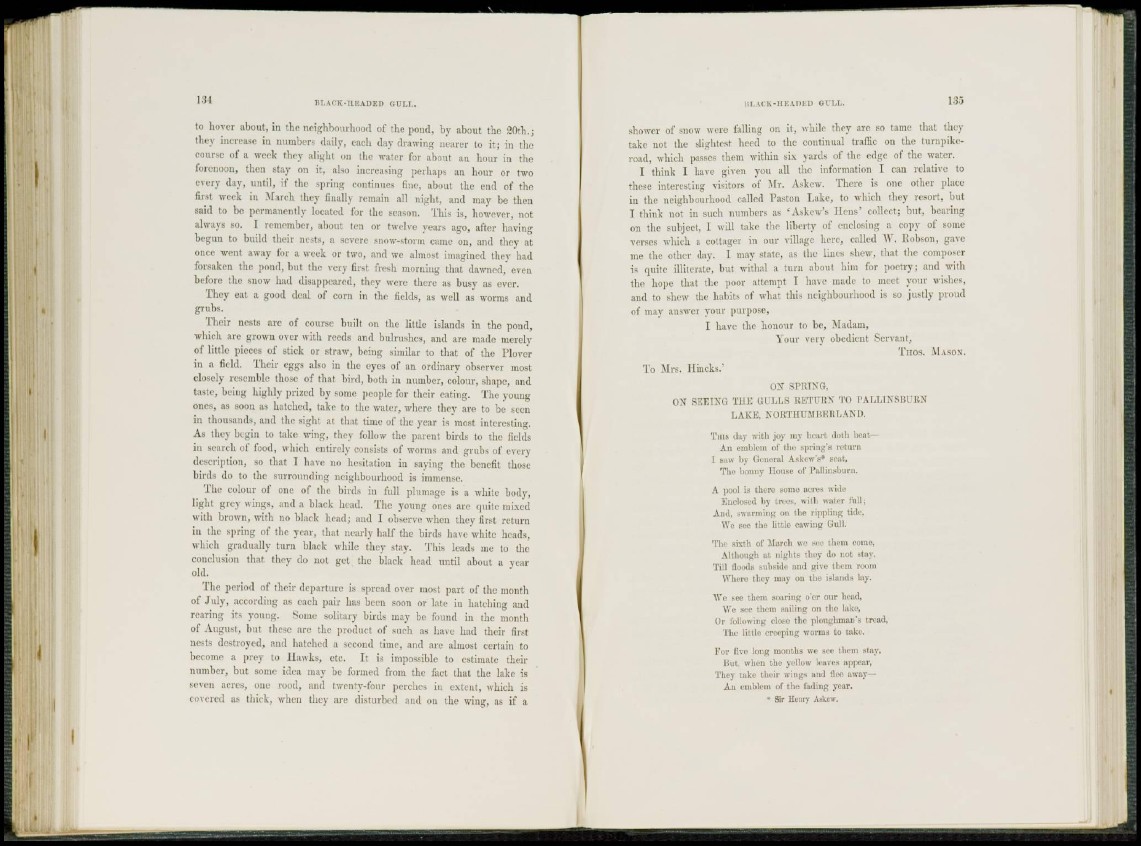
134 BLACK-HEADED GULL.
to hover about, in the neighbourhood of the pond, by about the 20th.;
they increase in numbers daily, each day drawing nearer to it; in the
course of a week they alight on the water for about an hour in the
forenoon, then stay on i t , also increasing perhaps an hour or two
every day, until, if the spring continues fine, about the end of the
first week in March they finally remain all night, and may be then
said to be permanently located for the season. This is, however, not
always so. I remember, about ten or twelve years ago, after having
begun to build their nests, a severe snow-storm came on, and they at
once went away for a week or two, and we almost imagined they had
forsaken the pond, but the very first fresh morning that dawned, even
before the snow had disappeared, they were there as busy as ever.
They eat a good deal of corn in the fields, as well as worms and
grubs.
Their nests are of course built on the little islands in the pond,
which are grown over with reeds and bulrushes, and are made merely
of little pieces of stick or straw, being similar to that of the Plover
in a field. Their eggs also in the eyes of an ordinary observer most
closely resemble those of that bird, both in number, colour, shape, and
taste, being highly prized by some people for their eating. The young
ones, as soon as hatched, take to the water, where they are to be seen
in thousands, and the sight al that time of the year is most interesting.
As they begin to take wing, they follow the parent birds to the fields
in search of food, which entirely consists of worms and grubs of every
description, so that I have no hesitation in saying the benefit those
birds do to the surrounding neighbourhood is immense.
The colour of one of the birds in full plumage is a white body,
light grey wings, and a black head. The young ones are quite mixed
with brown, with no black head; and I observe when they first return
in the spring of the year, that nearly half the birds have white heads,
which gradually turn black while they stay. This leads me to the
conclusion that they do not get the black head until about a year
old.
The period of their departure is spread over most part of the month
of July, according as each pair has been soon or late in hatching and
rearing its young. Some solitary birds may be found in the month
of August, but these are the product of such as have had their first
nests destroyed, and hatched a second time, and are almost certain to
become a prey to Hawks, etc. I t is impossible to estimate their
number, but some idea may be formed from the fact that the lake is
seven acres, one rood, and twenty-four perches iu extent, which is
covered as thick, when they are disturbed and on the wing, as if a
BLACK-HEADED GULL. 185
shower of snow were falling on it, while they are so tame that they
take not the slightest heed to the continual traffic on the turnpikeroad,
which passes them within six yards of the edge of the water.
I think I have given you all the information I can relative to
these interesting visitors of Mr. Askew. There is one other place
in the neighbourhood called Paston Lake, to which they resort, but
I think not in such numbers as 'Askcw' s l i e n s ' collect; but, bearing
on the subject, 1 will take the liberty of enclosing a copy of some
verses which a cottager in our village here, called W. Bobson, gave
me the other day. 1 may state, as the lines shew, that the composer
is quite illiterate, but withal a turn about him for poetry; and with
the hope that the poor attempt I have made to meet your wishes,
and to shew the habits of what this neighbourhood is so justly proud
of may answer your piirpose,
I have the honour to be, Madam,
Your very obedient Servant,
Tnos. MASON.
To Mrs. Hincks."
O N S P R I N G ,
O N S E E I N G T H E G U L L S R E T U R N T O P A L L I N S B U BN
L A K E , N O R T H U M B E R L A N D .
TinAsn deamy bwleimth ojof y llimuy sphreianrgt' s dorteht urbne at I Tsawh eby Gfurr.il Askcw's* seat, bonny House of PallinBburn.
A Epnocoll osies d thbeyr e trseoemse, waictrhe s wawtiedr e full; AmWi,e ssweie irtihnei ngl itotnl e tchaew irnigp plGinugl l. tide.
ThAe ltshioxuthg h of atM anricghh tsi rte hseey e dtoh enm ot csotmaey,. TilWl hfeloroe dst hseuyb smidaey aonnd tghiev e istlhaenmd s lraoyo. m
We see them soaring o'er our head, OrW fe olsloewc itnhg emc lossae iltihneg polno utghhem laank'es , trend, The little creeping wurms to take.
FoBr utf.i vwe hleonn g thmeo nytehlsl oww e lesaevee st haepmp easrt,a y, ThAeny teamkbe letmh,e ior f wtihneg sf aadnind g fyleeea r.a way— • Sir Henry Askew.